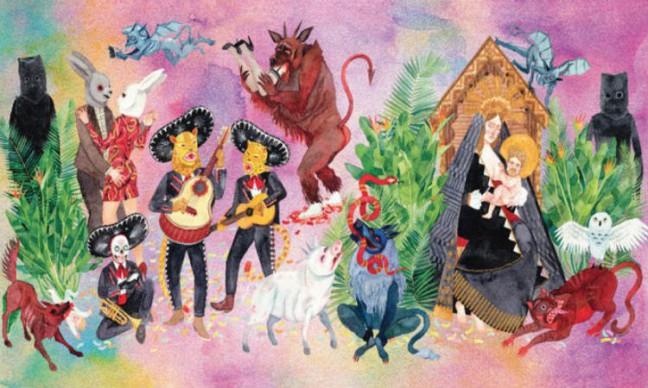The last few words of Father John Misty’s latest album I Love You, Honeybear, impeccably summarize the sentiment of the album: love is a precious and fragile commodity. Chronologically speaking, however, the line is taken from the beginning of the album’s narrative.
“I’ve seen you around, what is your name?” were the first words Josh Tillman (the man behind the Father John Misty moniker) uttered when he laid eyes on his future wife, now Emma Tillman, at the Laurel Canyon Country Store, Tillman told Grantland in an interview.
But don’t shrug this off as just another boring, cliché love album because of its overused focus. Tillman’s sharp wit and masterful songwriting transcend the typical perspectives on love and instead provide a 360-degree, no-holds-barred examination of what it means to love another person. Not just the bright, happy parts that are easy to sing about, but the less pristine aspects, as well.
Tillman’s candid approach to examining love is evident from the first song, which is also the title track. Tillman highlights the exclusivity and intensity of his love, “As death fills the streets we’re garden variety oblivious,” while also recognizing that we inherit even the worst traits from our parents that can compromise love, “I brought my mother’s depression / You’ve got your father’s scorn and wayward aunt’s schizophrenia.”
Later, in standout-track “Ideal Husband,” Tillman states that a man named Julian (perhaps a reference to WikiLeaks co-founder Julian Assange) is going to take his files. He lists exactly what files will be taken from him, chiefly those about his previously private shortcomings and mistakes such as neglecting friendships and not calling his family when his grandmother died.
The listening instructions that come with the album — yes, there are instructions and they are just as witty as the lyrics — hint at the difficulty of loving someone you know everything about. Tillman seems to think it’s a miracle anyone can stay in love with someone after knowing all of their faults.
Jaded Tillman even expresses moments of joy through his skeptical lense. In “Chateau Lobby #4 (in C for Two Virgins)” Tillman states, “People are boring / But you’re something else completely / Damn, let’s take our chances.” In the second last song, “Holy Shit,” his tone shifts suddenly to reflect the purity of his love, “Maybe love is just an economy based on resource scarcity / But I fail to see what that’s got to do with you and me.”
This deep feeling of love comes with more concern. In “When You’re Smiling and Astride Me,” Tillman expresses how fragile love can be, “When you’re smiling and astride me I can hardly believe I found you / And I’m terrified of that.”
The album isn’t wholly monothematic. Tillman mixes his love songs with cultural critiques exemplifying his trademark wit and snark. “The Night Josh Tillman Came to Our Apt.” so precisely characterizes an entitled millennial girl, it’s uncanny. Tillman tells of a girl (whom he chastises for misusing “literally”) who believes her half-baked, pseudo-philosophical ideas deserve merit and who eventually compares her own singing to Sarah Vaughan. Tillman then sings he “hates the soulful affectation white girls put on.”
Near the end of the album on “Bored in the USA,” Tillman condemns the American way of consuming to excess before cueing a laugh track that responds to his concerns and asks for help from “white Jesus” and later “President Jesus.”
https://www.youtube.com/watch?v=hIFrG_6fySg
While the main appeal of a Father John Misty album are the lyrics, the musical arrangements on this album deserve attention, as well. With heavy piano and folksy-guitar as the main instrumentation, Tillman also brings in horns, mandolins, violins and clarinets to accentuate the songs. The music itself is smooth and beautiful without detracting from the main attraction: the lyrics.
Tillman has crafted a great album, which incidentally provides a great profile of him and his wife. By setting out to write an album about love, Tillman has included some deeply personal feelings. In addition to singing about themes of love and relationships, he also delves deeper into personal issues of self doubt and self loathing. Tillman at some points seems to worry he’s a disappointment, that his first album as Father John Misty, Fear Fun, was a fluke and the public would see he was a fraud.
But perhaps having strung together two critically-acclaimed albums, Tillman will quell those feelings and focus on a third album.
4.5/5








